A Burning: A novel by Megha Majumdar
A well written debut novel about modern India and the injustices of the justice system
Chop Suey, USA: The Story of Chinese Food in America
I thought I was going to enjoy this but I didn’t. The beginning third of the book is a history of Chinese cuisine which I thought fair enough it’s creating a baseline. The next third is the colonial history of China and America, which ok it needs to be in the book and it’s setting up the interchange, but we’re running out of book here. The last third quickly skims over the last 200 years of history. It never really gets down into detail about how Chinese cuisine interacted with American cuisine, like what did Chinese cooks do when they couldn’t find ingredients? Modern Chinese restaurants are, though transference kind of denigrated as places where Americans expect cheap food. Which is true enough, but what about the owners of these restaurants? What are their hopes? How do they see their role in America? What are their stories? It kind of skips over all that. Really any kind of interaction of America which Chinese food is seen as denigrating the pureness of Chinese cuisine.
Interesting tid bits. I had no idea what chop suey was outside of that System of a Down song. Turns out it was just stir fry. General Tao’s Chicken was invented somewhere from the 50’s to the 70’s.
Ordinary Men: Reserve Police Battalion 101 and the Final Solution in Poland
Book about the reserve police force and their role in the mass executions in Poland and eventually the round up and leading Jews to the death camps. The conclusions were to be expected but also a bit unexpected. The general atmosphere was that the police initially didn’t want to do the round ups and mass executions, but once done then additional killings became common place.
The more opportunities given to people to not join in the less people wanted to do the killings. The first mass execution the leaders gave the option to any policeman who didn’t want to participate to leave. Very few people did. Those who remains felt worse about their actions. As as opposed to later when they were not given the option of leaving, then more people participated and more people felt better about doing it. Also the more direct killing the more people were reluctant to do the killing. Eventually the leadership got some Polish convicts to do the actual killing and then the German supervisors didn’t mind so much.
The overall hypothesis from the book is that there something like a 20/70/10 split in the population with regards to mass execution of civilians. Occupation, education, previous experience didn’t play too much of a role. With 20% really getting into the killing. Like a bit too much, the other 80% of the people tried to avoid them and didn’t really like them, then there’s 70% of people who didn’t really like doing it, but did it, but also loafed around and avoided assignments when not threatened to do them, but also didn’t go out their way to not do them. Then there’s 10% of people whose moral compass wouldn’t allow them to participate. Incredibly the German leaders generally protected these 10% from retribution for the other 90%, until some random psycho would get promoted into leadership then they wouldn’t.
A Short Stay in Hell by Steven L. Peck
Speaking of Mormons in stories. This is about a Mormon who gets sentenced to Hell for being a part of the wrong religion and the only way to escape Hell is to find the book that perfectly describes his life in an never ending library.
I enjoyed this a bit. Not too much but it had enough to chew on about life, love, the meaning and purpose in life when there is no hope out of infinity and it’s a brisk book.
The Art of Agile Development 2nd Edition
by James Shore & Shane Warden
Our official methodology is waterfall, but we’re in a not very technological and behind the times environment like nearly all hospitals, but they’re rolling out Jira and there’s some talk about changing methodologies. I enjoyed reading it and I’d be curious to watch a sprint happen in the way it’s explained, especially in a physical space as opposed to all remote as it sounds so different from how we do things.
Wasteland The Great War and the Origins of Modern Horror By W. Scott Poole
Kind of what is says, it talks about the newly original and terrifying horrors of the first war and pairs it along the burgeoning horror genres and shows how one affected the other. Some are very obvious, some he doesn’t quite prove his theisis as some people have been writing horror and specifically the types of horror he mentions before WW1 and other times we extends himself too much, but over it was a good book. It’s a good survey of art in the 1910-1940 and it introduced me to artists I didn’t know.

